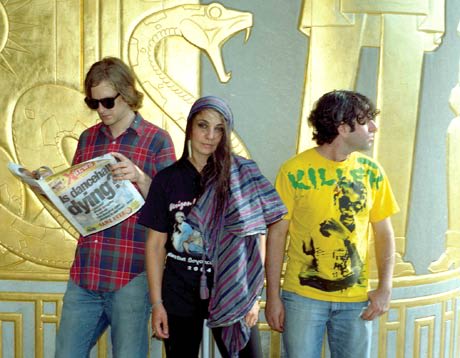A show by New York's Gang Gang Dance is always hotly anticipated in Vancouver, so the Biltmore Cabaret was tightly packed with eager fans as many more were turned away at the door.
First up were Vancouver's own Machu Picchu, an outfit that includes My!Gay!Husband!'s Jason Sulyma on drums. They played guitar pop bathed in gauzy shoegazer noise, and although the sound was fairly typical of the genre, the hooks were strong enough to keep things interesting.
Next were Basketball, who have been busily playing shows around Vancouver since their recent return from a year-long European sojourn. Though they weren't at their best, they piqued the interest of audience members who wouldn't normally find themselves at one of the less-publicized venues that the band tend to perform at. If they continue to play high-profile opening slots like this one, their prospects for the future are good.
True to their experimental roots, Gang Gang Dance don't play much that is immediately recognizable from their recorded output. In live performance, the songs don't exist as discrete entities - their parts are reconfigured and rehashed into a sort of chimerical, extended jam. One gets the impression that recordings like 2008's Saint Dymphna and their latest EP First Communion are really just snapshots of a constantly evolving oeuvre, which also explains the appeal of Gang Gang Dance's live shows: they allows you to observe their songs' evolutionary process. This makes a refreshing change from the usual rote performance of recorded material, as well as reflects a newly configured music industry where the album has become secondary to live performances.
First up were Vancouver's own Machu Picchu, an outfit that includes My!Gay!Husband!'s Jason Sulyma on drums. They played guitar pop bathed in gauzy shoegazer noise, and although the sound was fairly typical of the genre, the hooks were strong enough to keep things interesting.
Next were Basketball, who have been busily playing shows around Vancouver since their recent return from a year-long European sojourn. Though they weren't at their best, they piqued the interest of audience members who wouldn't normally find themselves at one of the less-publicized venues that the band tend to perform at. If they continue to play high-profile opening slots like this one, their prospects for the future are good.
True to their experimental roots, Gang Gang Dance don't play much that is immediately recognizable from their recorded output. In live performance, the songs don't exist as discrete entities - their parts are reconfigured and rehashed into a sort of chimerical, extended jam. One gets the impression that recordings like 2008's Saint Dymphna and their latest EP First Communion are really just snapshots of a constantly evolving oeuvre, which also explains the appeal of Gang Gang Dance's live shows: they allows you to observe their songs' evolutionary process. This makes a refreshing change from the usual rote performance of recorded material, as well as reflects a newly configured music industry where the album has become secondary to live performances.
